72% of Citizens Support Switching Franchised Buses to Zero-emission
Severe roadside air pollution in Hong Kong is threatening public health. The major source of roadside air pollutants is commercial vehicles, including buses, but the government has yet to lay out a timeline for the phasing out of fuel-propelled commercial vehicles.
Clean Air Network (CAN) commissioned the Hong Kong Public Opinion Research Institute to conduct a survey in November 2021, which found that 72% of the interviewed Hong Kong citizens supported transforming all franchised buses to zero-emission vehicles, and nearly half of the respondents wished to see at least 50% of the franchised buses switching to zero-emission vehicles by 2030.
As the survey results have clearly illustrated public demand on zero-emission public transport, CAN urges the government to set a timeline within one year for a full transition to zero-emission public transport. The Chief Executive candidate should also incorporate this policy into his platform.
- Survey Results
The survey was conducted during the period of 15 to 18 November 2021. A total of 1,008 Hong Kong residents aged 18 or above were successfully interviewed, including 506 landline and 502 mobile numbers.
The respondents were asked about their perceived impact of roadside air pollution on the health of themselves and their families. In general, they believed that roadside air pollution in Hong Kong has “little impact” on their own health, and also that of the elderly and children in their family; whereas they believed there is “great impact” on the chronic patients in their family.


When asked about their views on switching all franchised buses in Hong Kong to zero-emission vehicles, most respondents opted for “strongly agree” (46%), while 26% of them indicated they “somewhat agree” – by adding up the two figures, it is revealed that a majority of 72% of the citizens were in favour of the topic. Only 9% of the citizens expressed opposition.
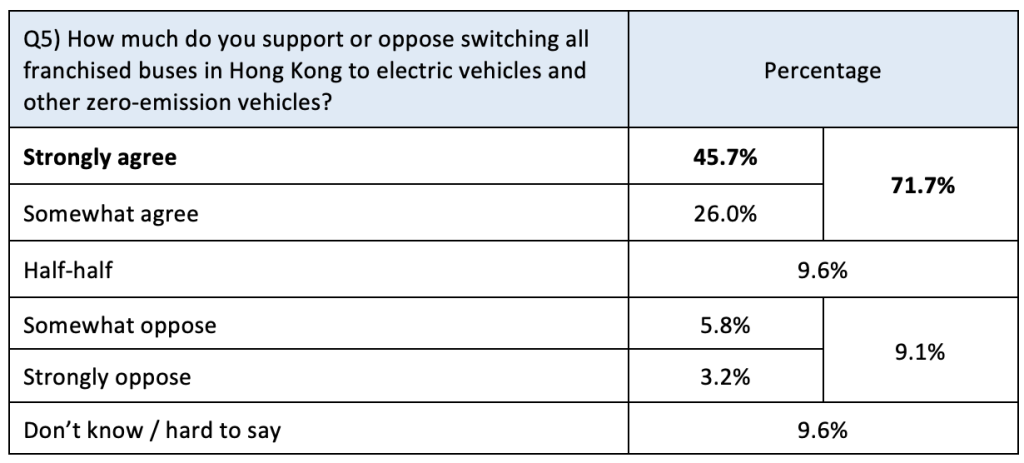
Nearly half (49%) of the citizens stated that at least 50% of the franchised buses in Hong Kong should be using zero-emission vehicles by 2030, while 9% of them said “the earlier the better”.
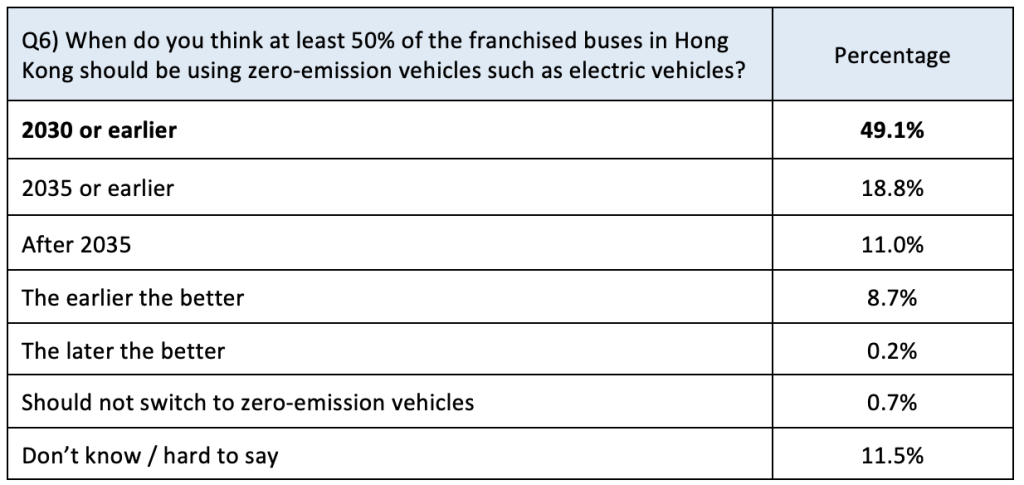
Most citizens (46%) said that the SAR government should bear the greatest responsibility for the full transition to zero-emission buses, while bus operators ranked second (24%).
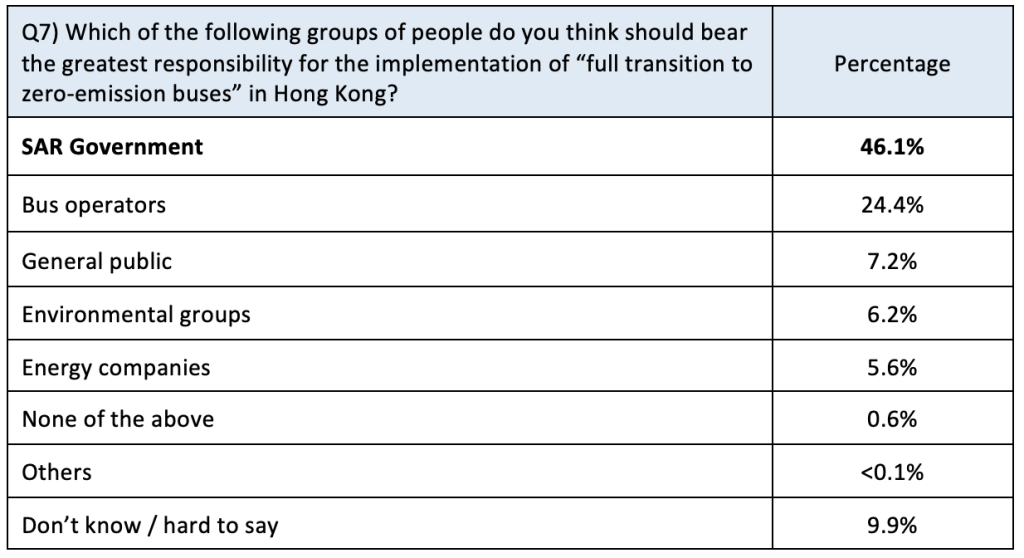
- Analysis
The results of the public opinion survey indicated local citizens were aware of the impact that roadside air pollution has on the health of themselves and their families. Roadside air pollutants, including PM10, PM2.5, and NO2, mainly come from car emissions. Taking in those pollutants could lead to respiratory and cardiovascular diseases, and even cancer. Children, the elderly, and chronic patients are particularly susceptible. Commercial vehicles, such as buses, trucks, and taxis, contributed to over 90% of the roadside air pollutants emitted by cars in Hong Kong, hence, the implementation of zero-emission commercial vehicles will benefit public health greatly.
As shown in the survey results, the majority of the citizens in Hong Kong, 72% of them, was very supportive of switching all franchised buses to zero-emission, whereas merely less than 10% of them indicated opposition, demonstrating a consensus on the issue. Almost half of the citizens wished that at least 50% of the franchised bus fleet will become zero-emission by 2030, and nearly 10% of them hoped to see that as soon as possible. Citizens have also indicated that the responsibility lies with the government.
Unfortunately, government policies fall short of citizens’ expectations. As of 2020, merely 0.6% of over 6,000 franchised buses in Hong Kong are electric. If the ratio is to rise from 0.6% to 50%, which is the demand citizens voiced out via this survey, much needs to be done. Yet, the government is not planning to lay out a roadmap for zero-emission commercial vehicles earlier than 2025.
Worse still, the Steering Committee on Promotion of Electric Vehicles, set up in 2009, comprised of Secretaries for various bureaus under the leadership of the Financial Secretary, “concluded its work” in September 2021 and left it to the Environment Bureau to follow up its work, undoubtedly downgrading the level of policy coordination even though its achievements remain unremarkable.
The government has been saying a timeline will be available after finishing the trials that are taking place. However, without an operational trial of a significant scale, it is impossible to understand the feasibility of using zero-emission buses in Hong Kong. Bus operators are now subsidized by the government to purchase electric vehicles via the New Energy Transport Fund and the Single-deck E-bus Trial, but the former, since its launch in 2011, has only supported the acquisition of 4 electric double-deck buses, and the latter only 36 single-deck buses. Furthermore, for the trials to be successful, infrastructure and technological support that ensure service level remains unaffected are essential, and these rely heavily on government resources.
- Policy Recommendations
For the sake of public health and alleviating the climate crisis, zero-emission transportation has already become a global trend. It is also a part of the national development plan – the 14th Five-Year Plan vowed to push forward the development of new energy automotive industry – which the Hong Kong government should also follow.
According to the estimation of World Resources Institute, in scenarios which Hong Kong bans fuel-propelled buses in 2026, 2030, and 2033, greenhouse gas emissions could be reduced by 10.3 million tons, 11.26 million tons, 12.87 tons respectively, economic benefit of avoided climate damages will be 7 billion dollars, 6.4 billion dollars, 5.5 billion dollars respectively, economic benefit from avoided health impacts will be 2.7 billion dollars, 2.5 billion dollars, and 2.1 billion dollars respectively. Apparently, the earlier the action, the greater the benefits for society.
To bring about a zero-emission bus fleet, the government has to take up leadership and push forward cross-bureau coordination. CAN urges the CE candidate to respond to public demand and incorporate the following policies into his platform:
1) Set out a time-specific roadmap for the transition to zero-emission buses.
2) Provide financial aid to franchised bus operators for the acquisition of new energy vehicles, covering the investment risks and costs involved.
3) Develop relevant infrastructure.
4) Remove regulatory barriers, including those concerning bus specifications and hydrogen, to facilitate the adoption of new energy vehicles.

